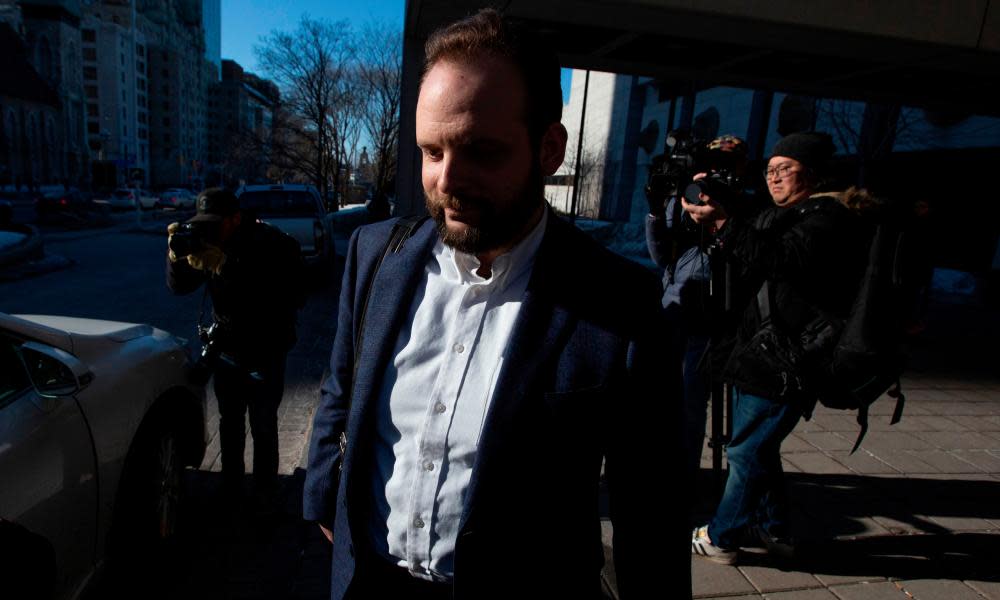Prosecutors slam 'fictional' testimony of man accused of abusing wife after Taliban ordeal

Canadian prosecutors have described Joshua Boyle as manipulative and abusive, dismissing the former hostage’s testimony as a “fictional, self-serving narrative” as the crown began its closing arguments in the high-profile trial.
On Tuesday afternoon, prosecutors attacked the credibility of Boyle, who, along with his American wife Caitlan Coleman, spent five years as captives of a Taliban-linked militia after they were kidnapped in Afghanistan.
Boyle, 36, faces 19 criminal charges – including sexual assault, assault and unlawful confinement – over incidents which allegedly took place after the family returned to Canada. He has pleaded not guilty to all charges.
“Mr Boyle manipulated [Coleman], exercised control over her, imposed his will on her and instilled fear in her,” said prosecutor Jason Neubauer. “He did this through emotional and physical abuse – demeaning her and striking her.”
Wearing an ash-coloured blazer and grey shirt, Boyle sat in court with his parents, taking notes on a pink legal pad. Coleman, who has previously testified by way of video link, did not participate in the court proceedings.
Related: Lawyers for former Taliban hostage say he’s ‘not easy to like’ but didn’t abuse wife
Boyle and Coleman, set off on a trip to central Asia after they married in 2011. Soon after entering Afghanistan, they were kidnapped by militants and transferred into the control of the Taliban-linked Haqqani network. The couple had three children during their five-year captivity.
In November 2017, the family was freed by Pakistani forces in a rescue operation. After their release, the young family moved to Ottawa, where they lived in an apartment until Boyle’s arrest on 31 December 2017.
Boyle’s defence on Monday cast him as an unlikable but honest witness, but the prosecution suggested Boyle’s testimony was motivated by self-interest and included “outright lies”.
The crown pointed to instances in which Boyle’s testimony shifted to evade incriminating behaviour, which Neubauer suggested “reflect[ed] poorly on his honesty as a witness”.
Earlier in the morning, Boyle’s team spent much of their time working to undermine the credibility of the testimony of Coleman who has accused Boyle of physically and sexually abusing her, both during captivity and during their time living in Canada.
Defence counsel Lawrence Greenspon told the court that Coleman’s history of anxiety attacks rendered her memory inaccurate and unreliable.
The defence also asked Justice Peter Doody to consider that Boyle and Coleman had recently experienced freedom after five years of captivity. While their marriage was “peculiar”, they were nonetheless “parents in freedom” for the first time and should be afforded a level of “tolerance” when assessing the accused’s conduct.
“Mr Boyle is unorthodox. Mr Boyle is unusual,” said Eric Granger, one of Boyle’s lawyers. But the court shouldn’t judge the accused’s credibility on the basis of how much Boyle “deviates from the norm”, said Granger.
The prosecution rejected this characterization of Boyle, suggesting his testimony was “rooted in fiction, not fact” and must therefore be rejected by the court.
“Boyle’s evidence must be rejected not because he holds unorthodox views,” said Neubauer. “The crown suggests his evidence is unbelievable … because it self-serving. It was argumentative, internally inconsistent and incompatible with common sense.”
The prosecution will continue its closing arguments on Wednesday. Boyle has opted for the trial to be overseen by a judge only.

